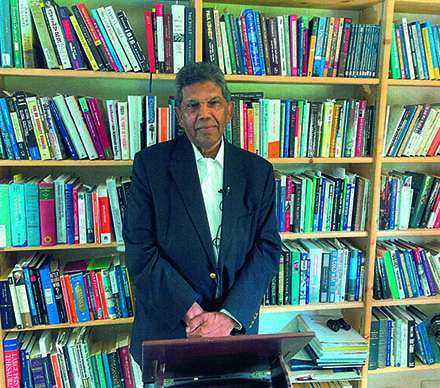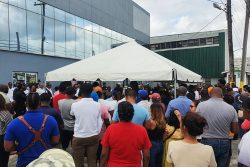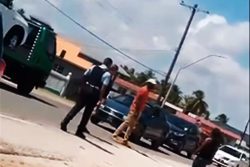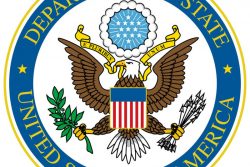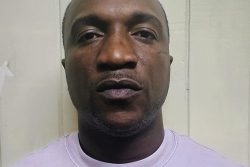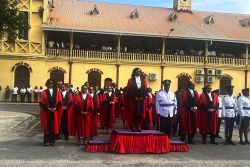By Dr Bertrand Ramcharan
Barrister-at-Law. Diploma of the Hague Academy of International Law.
This is written with full respect for Guyana’s highly-regarded team at the United Nations, and for its prestigious legal team on the boundary case.
On 11 April, 2024, the Stabroek News reported that, according to sources, Guyana had received ‘unanimous support’ from the United Nations Security Council when its members met at the request of President Irfaan Ali, to address Vene-zuela’s approval of the creation of a new state in Essequibo.
That was at an informal meeting of the Security Council of which no UN official record is kept. A Press Statement issued by the President of the Council on that occasion ‘expressed concern’ about the ‘possible escalation of tensions between Venezuela and Guyana’, urged the parties ‘to exercise maximum restraint’, and reminded them of their ‘obligations to comply with the Order of Provisional Measures issued by the International Court of Justice on 1 December, 2023.’
The members of the Security Council also “urged the parties to resolve their differences through peaceful means and to uphold their obligations under international law and the Charter of the United Nations.” Furthermore, they “reaffirmed the importance of upholding the principles of respect for the sovereignty and territorial integrity and the prohibition to any party, on the threat or use of force against the territorial integrity or political independence of another State, as enshrined in Article 2(4) of the Charter of the United Nations.”
It will be noted that the Presidential Statement was equidistant towards the two countries, in keeping with the practice of the Security Council. In the light of Venezuela’s announced intention a few days ago to elect a Governor of ‘Guayana Esequiba’, Guyana could now consider urgently calling for a formal meeting of the Security Council and requesting it to support the ICJ’s Provisional Measures of 1 December, 2023. Such a move would be in line with the provisions of the UN Charter and the rules of procedure of the Security Council.
Guyana is a Member of the UN Security Council serving a two-year term until 31 December, 2025. Guyana presided over the Security Council in February 2024 and will do so again for another month during 2025.
Rule 2 of the Security Council’s Rules of Procedure, provides that “The President shall call a meeting of the Security Council at the request of any member of the Security Council.” It is thus in Guyana’s right to request a formal meeting of the Council in support of its legal rights and in defence of its territorial integrity.
In 1966 Guyana was admitted as a member of the United Nations with its sovereign territory as demarcated under the 1899 Arbitral award. The United Nations is under an obligation to support and defend that territorial integrity. The ICJ affirmed this principle in the Chagos Advisory Opinion.
Guyana has sought to defend its territorial integrity by bringing a case before the International Court of Justice, seeking the Court’s affirmation of the validity of the Arbitral Award of 1899. That case is taking its course before the ICJ.
The ICJ, in an Order of 1 December, 2023, directed that Venezuela “shall refrain from any actions that would modify the situation prevailing in the disputed territory, which is currently administered by Guyana.” The Order added that both States must avoid actions that might aggravate or extend the dispute or make it more difficult to resolve. Guyana has been fully compliant with this Order.
However, notwithstanding the ICJ’s Order, Venezuela, held a referendum on 3 December 2023 seeking the annexation of Guyana’s Essequibo. Then, on April 3, 2024, President Maduro promulgated an ‘Organic Law for the Defense of Guayana Esequiba’. That prompted Guyana’s approach to the Security Council in April, 2024.
Continuing its pattern of actions in breach of the Order of the ICJ, President Maduro announced, on 7 January, 2025, that Venezuela would proceed to elect a “Governor of the Guayana Esequiba” by “the people of Guayana Esequiba”. Guyana has vigorously protested against Maduro’s announcement, pointing out that “The people of Guyana’s Essequibo region are Guyanese nationals who live in Guyana’s sovereign territory.” It added that “It would be a flagrant violation of the most fundamental principles of international law, enshrined in the UN Charter, for Venezuela to attempt to conduct an election in Guyanese territory involving the participation of Guyanese nationals”.
Guyana pointed out that “President Maduro’s statement, coupled with any actions to integrate the Essequibo region into Venezuela’s administrative framework, including by calling for an election `by the people of Guayana Esequiba’ of a governor of `Guayana Esequiba,’ represented a blatant disregard for the binding Order of the ICJ of 1 December, 2023.” It added that such actions not only jeopardized the judicial process but also undermined the authority of the ICJ as the principal judicial organ of the United Nations.
Guyana reserved the right to ask the ICJ for additional provisional measures in the event that Venezuela takes any steps toward conducting its so-called “election” in Guyanese territory or involving Guyanese nationals. In addition to this, it is respectfully suggested that, in accordance with Article 94(2) of the UN Charter, Guyana should now seek the formal backing of the Security Council for the ICJ Order of 1 December, 2023.
Article 94(1) of the United Nations Charter states that “Each member of the United Nations undertakes to comply with the decisions of the International Court of Justice in any case to which it is a party.” The second paragraph of Article 94 provides a solid basis for Guyana to take its case to the Security Council. It states:
“If any party to a case fails to perform the obligations incumbent upon it under a judgment rendered by the Court, the other party may have recourse to the Security Council, which may, if it deems necessary, make recommendations or decide upon measures to be taken to give effect to the judgement”.
The ICJ’s order that Venezuela “shall refrain from any actions that would modify the situation prevailing in the disputed territory, which is currently administered by Guyana” has the status of a judgment rendered by the ICJ and Guyana is entitled to seek the support of the Security Council for the enforcement of this judgment.
Guyana could urgently request a formal, open meeting of the UN Security Council to protest against Venezuela’s continuing aggression against its sovereignty and territorial integrity and to seek its backing for the ICJ Order of 1 December, 2023. An open meeting of the Security Council would have Official Records and Guyana could consider presenting a draft resolution seeking the formal backing of the Council for the ICJ’s Order of 1 December, 2023.
